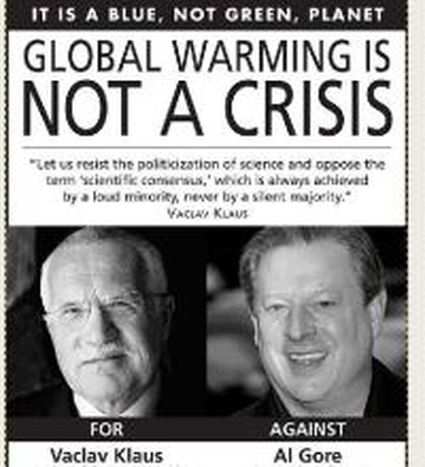
Obama ends the "war on science"
Published on
In every area of scientific research there is controversy. Hypotheses and bold assumptions are made, argued for and against, tested, and eventually accepted or rejected. An example of such a process was triggered by an idea put forth by the . He asserted rather then increasing concentration of Greenhouse gases influence the Earth's climate and cause Global Warming.
That was a skeptical hypothesis. The European laboratory CERN built to test that hypothesis. , but preliminary show that the effect of cosmic rays is, at most, very small. The hypothesis was welcome, and tested. That is part of the normal scientific debate.
Danish scientist Svensmark that cosmic rays, an experimentThat research is still underwayresults
Research concerning climate and climate change, or "global warming," has attracted far more controversy than normal scientific debates, controversy which plays out primarily in the popular press and on the Internet.
This blog has vowed to listen to both sides of any controversy. The data quoted above are from mainstream sources, meaning data collected by government-supported research centers and collated by organizations such as (IEA) or (WMO) . The question is: How should I deal with opinions which strongly contradict those data and conclusions? How much space should I give to the spectrum of opinions, arguments and convictions?
Researching web resources for this post gave me this perspective on this question: In the final section below I describe the history of the Earth's changing atmosphere. As I compiled this, I remembered that levels of oxygen were rising during the early formation of our planet, due to photosynthesis by plants, until the time when animals appeared. Wanting to verify the time when animals appeared on the planet, I entered two search queries into the Google search engine. They differed in only in one word, "origin" vs "creation," of animals. The results surprised me:
Amazing! There are almost as many Internet pages devoted to creationist questions, questions such as: as pages devoted to mainstream science. Some of those pages look more serious, bringing in thermodynamics, entropy, and mathematical formulas. Their aim is to prove the "Young Earth 'fact'", that the Earth was created 6000 years ago, as the Bible is held to reveal. Their goal is to prove that evolution could not have happened and to disprove the . 21,300,000 English pages for origin of animals. 15,800,000 English pages for creation of animals."How did all the animals fit on Noah's Ark?"
The photo shows "Adam and Eve" palling around with dinosaurs, according to the built in the Ohio. I concluded that I cannot give "equal time" to all views. I will mention websites, but not deal with "arguments" repeated over and over again in order to prove some dogma. Science does not have a goal to prove or disprove any "known truth" or hypothesis. Its one essential goal is to find the truth. It is a very concrete search filled with constant questioning and rigorous testing. Science is not divorced from a sense of awe and wonder at Creation. It just doesn't force its conclusions into a mold formed by an interpretation of the Bible.The area of the climate research is not much different than the field of evolution. The controversy surrounding these two areas of science actually shares some of the constituency: people who suspect or reject mainstream science on ideological grounds, and who oppose government actions using the same rationale.
The relationship of scientific research to government, and of ideology to public policy, was well-illustrated in the recent drama of the U.S. presidential elections. On one side was Vice Presidential candidate Sarah Palin who claimed that dinosaurs and people coexisted and also supported the Bush administration's "war on science" in the areas of environment and climate. Mainstream science tended to align itself with the opposing party. This may have contributed, in small part, to Mr. Obama's victory.
The End of the Flat Earth Society?
The U.S government has now changed in ways Americans could not have imagined during the past eight years. The scientific community has hailed Obama's appointments to science-related posts, as have a good many ordinary citizens. A Nobel laureate physicist will now head the Department of Energy, for example.
"After the anti-science Bush administration, this is like going to a Mensa meeting after eight years of being trapped in the Flat Earth Society." was one liberal commentator's remark about Obama's science appointments.
Said a typical physicist: "Some good news: grownups will soon be running U.S. science policy."
On the other hand, the reaction of another physicist, known for his strong right-wing convictions, was: Harebrained theorist John Holdren will become Obama's science adviser. Dr Horden's briefing which brought about that reaction is highly recommended viewing for serious consideration. It is 61 overhead transparencies which review what he calls "climate disruption."
With U.S. President Bush's exit, the dubious honor of having an anti-science president now passes to the European Union assumes in January. He was to abandon the "climate change religion" and "return to reason."Stepping into Bush's shoes
recently heard exhorting scientists
Obama intends to set the U.S. on a course towards resuming a science leadership position in the world, not least in the areas of the environment and climate change. Controversy continues, of course, but in next 8 years we should be able to compare and evaluate the results of Bush's policies and policies of Obama's team.




